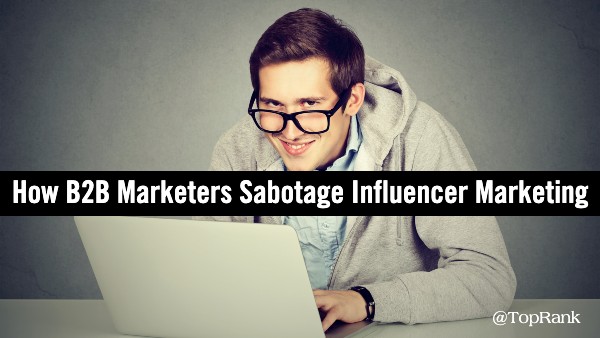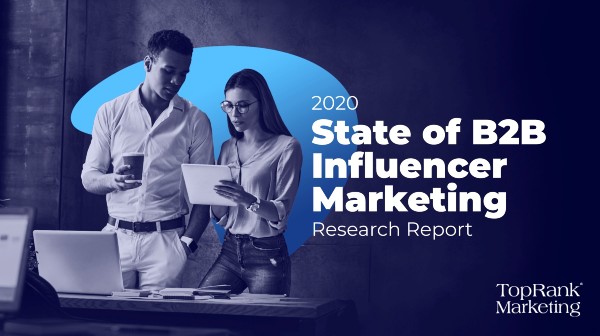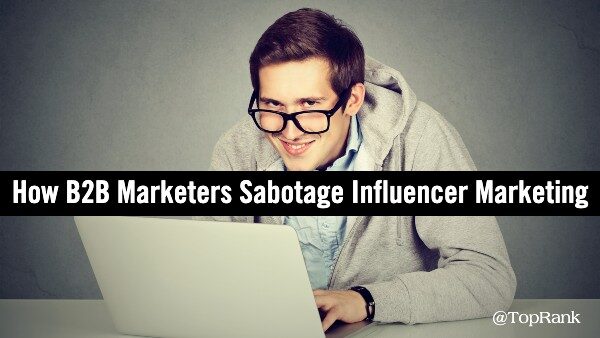
It is the nature of marketers to continuously evaluate the effectiveness of their efforts. The problem with this approach to marketing optimization is that it assumes effective execution of marketing strategies, which we all know, is often not the case. Poor execution is as often at fault for poor performance as much as the effectiveness or appropriateness of the tactic.
For nearly 10 years we’ve been engaged in influencer collaboration for B2B content marketing programs (like this one for Content Marketing Institute in 2012) and have worked with a wide range of B2B brands during that time. We’ve fielded multiple times that in inquiries and questions from B2B marketers about influencer marketing as well as conducting the first ever dedicated research study into B2B influencer marketing. This depth of experience has provided unique and far reaching insight into how B2B brands understand and implement content marketing efforts in partnership with influencers – good, bad and otherwise.
While the B2B marketing industry has evolved and become more sophisticated with influencer adoption rates on the rise, old habits and bad habits often remain. Our focus on influence as a B2B marketing discipline has enabled us to identify the best practices as well as the ways in which B2B marketers continue to sabotage the success.
Avoiding bad practices is a strong first step to ensuring investments in influencer marketing programs result in expected returns. Here are 5 of the most common things B2B marketers do to sabotage their influencer marketing success:
1. Waiting to Recruit
The best time to recruit an army is not on the first day of the war.
That’s probably not the best analogy, but approaching influencers as an afterthought vs. as part of the planning of a marketing effort is a big mistake. For B2B brands that are new to working with influencers, it is important to understand that influencer recruitment takes time (and skill). Being able to engage the right mix of influencers on a very short timeframe without pre-existing relationships is unlikely. That’s a problem if a B2B marketing effort is counting on those influencers to add credibility and target audience reach to the campaign.
Best practice: The time to start recruiting influencers is long before you need to activate them for a content collaboration. This is especially true where influencer engagement will be mostly or all organic vs. paid. B2B marketers need to put their empathy hats on and think about how to create value and a sense of urgency for the influencer. Successful B2B marketers do that through relationship building vs. thinking influencers are simply waiting to work for free when the B2B marketer emails them.
There are ways to fast-track relationship building with influencers and we use those strategies regularly within our influencer marketing practice at TopRank Marketing. But doing so draws upon many years of experience, established processes, technology and strategy. Without that experience, B2B marketers should think about following, interacting with and creating value for influencers that they want to activate months in the future in order to get the highest quality contributions, enthusiastic and authentic promotion.
2. Believing the Hype
Follower counts and ability to influence are not the same thing.
With the popularity of influencer marketing across B2C and B2B industries, the attraction to boost network size exists for every person that identifies as an influencer. The reality is, within most B2B verticals, the most influential people don’t always self promote themselves as influencers and may not even pay much attention to growing their networks.
Instead, many people who are influential in a B2B industry are focused mostly on doing the work they’re known for. The lesson to learn is not to rely solely on social network size (fans, friends and followers) or overly self-promotional “influencers” since the hype simply doesn’t translate into action in B2B.
Best practice: Influence in B2B is based on real expertise, respect and third party validation by peers, communities, publications, professional organizations and often, academic institutions. It is especially important to understand that in B2B, influence may be a mix of online; which is easier to validate with influencer software, and offline; which is harder to source and validate. Marketers should validate the influence of potential experts by qualifying the topics they are known for with how the communities they are expected to influence see them. Topical relevance, resonance with the community and reach are the basic data points for evaluating B2B influencers.
Having a million followers in B2B is very unique and that person could be a great match, but don’t rely on network size alone to evaluate influencers. Do the homework to validate they are topically relevant to your audience and the campaign. Validate that their audience is the audience your B2B brand wants to reach. Otherwise, you’re wasting everyone’s time.
3. Content Mismatch Creates Customer Confusion
A person’s influence is specific to topic, content type and channel.
B2B marketers may find an influencer that is topically relevant and has the audience the B2B brand needs to reach, but if the content vehicle the B2B brand uses to engage that audience isn’t what the influencer is known for, it may not be trusted or create confusion, “Why is this person known for a podcast doing videos for a B2B brand I’ve never heard them talk about before?”
Best practice: Identify influencers that are topically relevant and also take into consideration the brand mentions and content formats the influencer is most known for. Influencer marketing or social media software can help identify to what degree a potential influencer mentions your B2B brand. You can also see what content formats they publish most and what formats resonate best with their audiences.
For example, if an influential podcaster talks about Adobe in a positive way fairly often, then it makes sense to engage that influencer via a brand podcast for an Adobe content activation – assuming they are validated on expertise, topical relevance, resonance and reach of course.
4. Transactional Approach Leads to Little Action
Inspiration is far more powerful than commoditized value exchanges for influencer engagement.
Many B2B marketers view working with influencers through the lens of B2C, which has had much faster and greater adoption than in the business world. B2C influencer engagements are almost always treated like an advertising buy where the value exchange is about paying an influencer to create content that is hosted and promoted on the influencer’s own social channels.
In B2B, many of the people that are most influential do not monetize their influence through transactional value exchanges like we see in B2C. Their motivation for engaging in a collaboration on content with a B2B brand might be more about growing the influencer’s own credibility and authority around a certain topic that they write books about, speak professionally about or provide consulting around.
Therefore, B2B brands that treat influencer engagement purely as a transaction will often not get the reaction that they are looking for or not get the emotional investment needed to generate the most credible and authentic content creation, and promotion that is needed.
Best practice: Part of the influencer recruiting process is for B2B brands to make an effort to understand what motivates the influencer. Are they brandividuals that solely monetize through paid influencer engagements? Are they an industry expert whose credibility amongst peers would be elevated if they worked with your B2B brand? Are they a respected professional with a high quality audience that believes in the vision of your B2B brand and wants to be a part of it?
Find out what the influencer is motivated by and how a collaboration with your B2B brand can help them achieve their goals. Then focus on creating a great experience for the influencer that is more meaningful than mechanical. If they care, they’ll share!
5. Failure to Communicate
Influencer relations requires special skills, especially the ability to empathize.
Effective communications is everything to a successful B2B influencer engagement. Whoever is responsible for directly engaging influencers and managing the relationships must have the ability to work with all types of people from high profile industry celebrities to introverted subject matter experts that don’t identify as influencers at all – even though they are. Communications is also about every point of contact from how the influencer outreach is conducted to how activation asks are made to how ongoing engagement is done.
Failure to communicate with empathy and relevance during the first outreach can turn influencers off as much as asking too much too soon or clearly not having done research on who the influencer is and what they are most passionate about.
Best practice: Do the homework to understand influencers before doing outreach. Understand their motivations and how a collaboration will help the influencer vs. only thinking about what’s in it for the B2B brand. Once an influencer has agreed to collaborate, make it easy and enjoyable for them to do so. Set expectations, be organized and helpful, share progress of the program and feedback about their contributions. Most of all, plan for some kind of ongoing communication to keep the relationship warm so the next activation is something the influencer looks forward to vs. only engaging influencers when you need them.
There are many ways to do influencer marketing wrong in B2B, but these are some of the most common ways we see B2B marketers sabotaging their own success. It comes down to understanding that influencers are people with emotions, goals, problems and a desire to be part of something bigger than themselves.
Successful B2B Influencer Marketing is a relationship business, not simply a transaction.
When B2B marketers can add a greater level of expertise, empathy and skill to influencer engagement, they will often see how impressive the results for everyone involved can be.

Be sure to check out the State of B2B Influencer Marketing Report for more insights on influencer marketing planning, best practices, case studies, measurement and predictions for the future.



